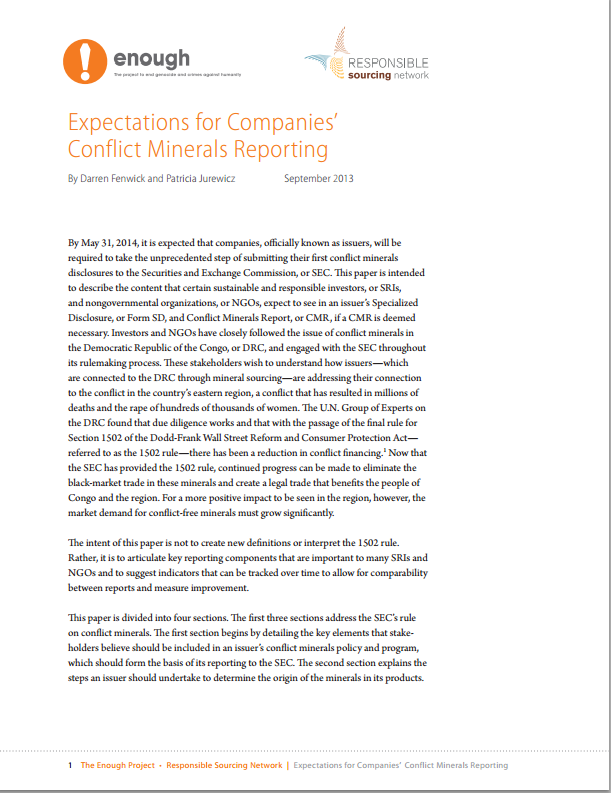
By May 31, 2014, it is expected that companies, officially known as issuers, will be required to take the unprecedented step of submitting their first conflict minerals disclosures to the Securities and Exchange Commission, or SEC. This paper is intended to describe the content that certain sustainable and responsible investors, or SRIs, and nongovernmental organizations, or NGOs, expect to see in an issuer’s Specialized Disclosure, or Form SD, and Conflict Minerals Report, or CMR, if a CMR is deemed necessary. Investors and NGOs have closely followed the issue of conflict minerals in the Democratic Republic of the Congo, or DRC, and engaged with the SEC throughout its rulemaking process. These stakeholders wish to understand how issuers—which are connected to the DRC through mineral sourcing—are addressing their connection to the conflict in the country’s eastern region, a conflict that has resulted in millions of deaths and the rape of hundreds of thousands of women. The U.N. Group of Experts on the DRC found that due diligence works and that with the passage of the final rule for Section 1502 of the Dodd-Frank Wall Street Reform and Consumer Protection Act— referred to as the 1502 rule—there has been a reduction in conflict financing. Now that the SEC has provided the 1502 rule, continued progress can be made to eliminate the black-market trade in these minerals and create a legal trade that benefits the people of Congo and the region. For a more positive impact to be seen in the region, however, the market demand for conflict-free minerals must grow significantly.
The intent of this paper is not to create new definitions or interpret the 1502 rule. Rather, it is to articulate key reporting components that are important to many SRIs and NGOs and to suggest indicators that can be tracked over time to allow for comparability between reports and measure improvement.
This paper is divided into four sections. The first three sections address the SEC’s rule on conflict minerals. The first section begins by detailing the key elements that stakeholders believe should be included in an issuer’s conflict minerals policy and program, which should form the basis of its reporting to the SEC. The second section explains the steps an issuer should undertake to determine the origin of the minerals in its products.
The third section explains the four due diligence processes an issuer should undertake to ensure its supply chain practices respect human rights and do not contribute to conflict: (1) identify risks in its supply chain; (2) ensure compliance to its policy and program; (3) respond to identified risks and non-compliance; and (4) describe the policies and communication used to implement the previous processes. The fourth section asks issuers to report on the steps they are taking to ensure a conflict-free Congo, not a Congo-free product. Stakeholders expect issuers to include in their filings to the SEC any initiatives or activities they are undertaking or will undertake to support a clean mineral trade in the DRC.
This document is for guidance purposes only and should not replace professional legal advice from corporate or outside counsel.

